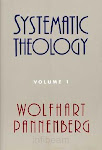Part 1, Part 2, Part 3, Part 4, Part 5, Part 6
Two more items remain to be discussed in this last part. The first involves “forcing categories of later thought upon earlier eras” and my inability to understand what the author means by this. The second is a weakness in his analysis of Boethius’ Consolation of Philosophy – a weakness which does not, however, cast a shadow on the author’s expertise but rather serves as a gentle reminder (to any reader in awe with his theological and literary finesse) that no one is perfect.
“Mind Your Century”
Pelikan habitually reminds us, the readers, and himself, the historian, “not to superimpose later categories of thought” to earlier centuries.
For example, as regards the doctrine of the Eucharist, this means that “the effort to cross-examine the fathers of the second and third century about where they stood in the controversies of the ninth or sixteenth century is both silly and futile” (p. 167). Later: “It is incorrect … to attribute to Augustine either a scholastic doctrine of transubstantiation or a Protestant doctrine of symbolism, for he taught neither – or both – and both were able to cite his authority” (p. 305). On another topic: “It is too facile to dismiss this [the theory of the indwelling Logos] as ‘Pelagianism before Pelagius,’ for it did not really fit into the categories of the Western development” (p. 285).
On one hand, the principle of “not superimposing later categories” and the principle’s implementations above sound reasonable. Yet scruples against this principle remain, to some degree.
For we clearly cannot mean that earlier generations could have nothing to say about later generations’ interests, or that later generations cannot (and should not ex principio) seek the opinion of earlier generations. Is not much of theology “bound” (or aided) by this way, in that it seeks the faith of “our forefathers in the faith”?
My question, therefore, is: What are the ground rules for deciding when it is possible and when it is not possible to do so? If Pelikan follows some clear-cut methodology, he does so silently, and neither my skill nor time allowed its explicit recovery.
Boethius and his Consolation of Philosophy
For those of you who don't know him, Boethius was a Christian philosopher who lived in the 6th century. He was tortured to death in 525 by the king of Ostrogoths. His Consolation of Philosophy is one of the timeless world classics.
Unfortunately this last part must be updated later. Here in Dar es Salaam (where I'm writing), I do not have C. S. Lewis' The Discarded Image. In it he explains, as a literary historian and critic, why he does not believe that Boethius wrote his Consolation of Philosophy in prison, as many - or most - have supposed.
Consquently, if it can be showed that it is doubtful that Boethius wrote it in prison, the question posed by perplexed Christians and excited secular philosophers, "Why would Boethius, in the hour of his death, find consolation in philosophy, and not in theology?" becomes irrelevant.
It's not that he doesn't find consolation in theology (or simply "faith"); it simply means that he - as a free Christian writer - wanted to write a book on the consolation of philosophy. Writing a book, "The Pleasure of Movies" does not mean you don't think books are pleasurable. In fact you may think books are more pleasurable than movies.
2 weeks ago







4 comments:
kiitos hyvästä sarjasta ja kiva et oot kunnon teologian kimpussa...pitää joskus lukee noi mut jotkut jutut oli kyl tuttuja jo muiden sitaateista. ja kiva et luet vihdoin lewisin trilogiaa! mäkin luen periaattees tokaa osaa, tosin en kovin intensiivisesti,puoltusinaa muuta kirjaa samalla menossa...
Pelikanin kristillisen opin kehityksen historia on kyllä teologiaa siitä paremmasta päästä.
Luin Space-trilogian ekan osan loppuun, mutta valitettavasti olin lähettänyt osat 2 ja 3 takaisin Suomeen, kun ajattelin etten ehdi täällä lukea fiktiota. Nyt pitää pyytää ne takaisin esim. maaliskuussa, jolloin mun vanhemmat tulee tänne työmatkalle...
Toivottavasti opetusharjoittelusi on mennyt kivasti. Musta se pedagogiikka-vuosi oli opiskelun parhaita.
Hei! Eikö niiden blogitekstien pitäny olla lyhyitä? ;)
Kirjoitan kommenttini sitten vuoden loppupuolella, kun olen kahlannut ne läpi
Heidi, nehän ON lyhyitä. Kuusi lyhyttä bite-size kirjoitusta, jotka vielä selventäviä väliotsikkoja täynnä. Kaikkea ei tartte lukea, lukee vaan ne mitkä kiinnostaa. ;-)
Post a Comment